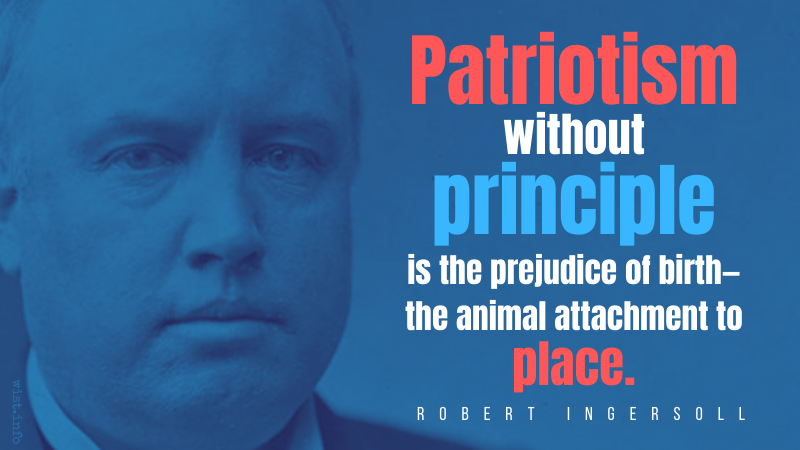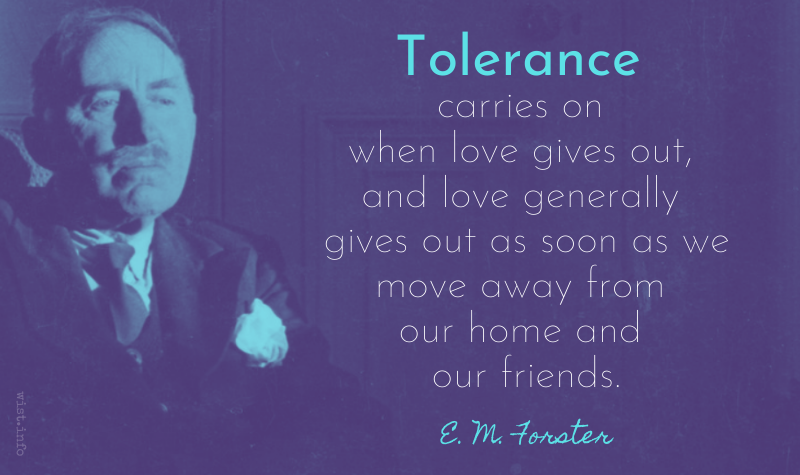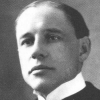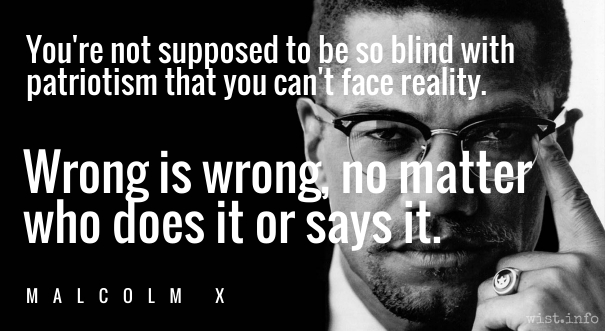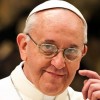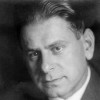Well, it is part of our emotional apparatus that we are liable to both love and hate, and we like to exercise them. We love our compatriots and we hate foreigners. Of course, we love our compatriots only when we’re thinking of foreigners. When we’ve forgotten foreigners, we don’t love them so much.
Bertrand Russell (1872-1970) English mathematician and philosopher
Interview by Woodrow Wyatt, BBC TV (1959)
Collected in Bertrand Russell's BBC Interviews (1959) [UK] and Bertrand Russell Speaks His Mind (1960) [US]. Reprinted (abridged) in The Humanist (1982-11/12), and in Russell Society News, #37 (1983-02).
Quotations about:
tribalism
Note not all quotations have been tagged, so Search may find additional quotes on this topic.
You know not, will not know, what Christians are;
Their pride is to be Christians, never men;
Ay, even that which since their Founder’s time
Hath tinged their superstition with a touch
Of pure humanity, is prized by them
Never because ’tis human, but because
‘Twas preached and practised by their Jesus Christ.
‘Tis well for them he was so rare a man;
Well that they take his virtues upon trust;
But what to them the virtues of their Christ?
‘Tis was not his virtues, but his name alone
They seek to spread, that it may dominate
And cloud the names of other noble men;
Ay, ’tis the name, the name of Christ alone
Your Christian cares about.[Du kennst die Christen nicht, willst sie nicht kennen.
Ihr Stolz ist: Christen sein; nicht Menschen. Denn
Selbst das, was, noch von ihrem Stifter her,
Mit Menschlichkeit den Aberglauben würzt,
Das lieben sie, nicht weil es menschlich ist:
Weil’s Christus lehrt; weil’s Christus hat getan.—
Wohl ihnen, daß er so ein guter Mensch
Noch war! Wohl ihnen, daß sie seine Tugend
Auf Treu und Glaube nehmen können!—Doch
Was Tugend?—Seine Tugend nicht; sein Name
Soll überall verbreitet werden; soll
Die Namen aller guten Menschen schänden,
Verschlingen. Um den Namen, um den Namen
Ist ihnen nur zu tun.]Gotthold Lessing (1729-1781) German playwright, philosopher, dramaturg, writer
Nathan the Wise [Nathan der Weise], Act 2, sc. 1 [Sittah] (1779) [tr. Maxwell (1917)]
(Source)
(Source (German)). Alternate translations:
You do not know the christians.
You will not know them. 'Tis this people's pride
not to be men, but to be christians. Even
what of humane their founder felt, and taught,
and left to savour their fond superstition,
they value not because it is humane,
lovely, and good for man; they only prize it
because 'twas Christ who taught it, Christ who did it.
'Tis well for them he was so good a man:
well that they take his goodness all for granted,
and in his virtues put their trust. His virtues --
'Tis not his virtues, but his name alone
they wish to thrust upon us. -- 'Tis his name
which they desire should overspread the world,
should swallow up the name of all good men,
and put the best to shame. Tis his mere name
they care for --
[tr. Taylor (1790)]
Thou dost not know the Christians, wilt not know them.
Their pride, that is: the Christian; not the Man.
For even what, still coming from their founder,
With human worth, imbibes their superstition,
Is not adored by them, because 'tis human:
No, but because Christ taught, Christ acted so. --
'Tis well for them, that yet so good a man
He was! 'Tis well for them, that they may take
His virtue granted, and on faith! -- But what
Of virtue! -- Not his Virtue; no, his Name
They wish to spread all o'er the world; his name
Shall stigmatize the names of all good men,
And swallow them. The name, and but the name, --
That's what they cherish.
[tr. Reich (1860)]
You do not, will not, know the Christian race.
It is their pride not to be men, but Christians.
The virtue which their founder felt and taught,
The charity He mingled with their creed,
Is valued, not because it is humane,
And good, and lovely, but for this alone,
That it was Christ who taught it, Christ who did it.
;Tis well for them He was so good a man.
Well that they take His goodness all on trust.
And in His virtues put their faith. His virtues!
'Tis not His virtues, but His name alone
They wish to thrust upon us -- His mere name,
Which they desire should overspread the world,
Should swallow up the name of all good men.
And put the rest to shame. 'Tis for His name
Alone they care.
[tr. Boylan (1878)]
Thou knowest not the christians, will'st not know them:
Their pride is to be Christians, and not men.
For even that which from their Founder's time
Seasons their superstition with humanity, --
That love they not because 'tis human; -- no,
Because Christ taught it and Christ practised it.
'Tis well for them that he was really such
A good man! Well, that they can take on trust
His virtue! Yet what speak I of his virtue?
'Tis not his virtue, 'tis his name alone,
That over all the earth shall spread abroad,
To put to scorn and swallow up the name
Of every other good man. 'Tis the name,
The name alone they care for, they.
[tr. Corbett (1883)]
Thou knowest the Christians not -- wilt not know them.
Their pride is to be Christians -- not men. For
Even that humanity, which by their Founder
Was rooted in their superstition, that love they
Not because it is humane, but because
He taught it -- because so Christ hath done.
Tis well for them He was indeed so
Good a man. 'Tis well for them that they
His virtue can accept on faith, and on belief.
His virtue say I? Not His virtue. His name alone
Shall over all be spread, and shall the name
Of all good men shame and destroy. The name --
And nothing but the name -- is their concern.
[tr. Jacks (1894)]
You do not know the Christians, don’t want to know them. Their pride is to be Christians, not men. Because even what leavens superstition with mitigating aspects, -- dating back to their founder -- they don’t love because it is human. (They love it) because Christ teaches it, because Christ has done it. Lucky they that such a good man existed yet! Lucky they that they can take his virtue on faith and belief! But what virtue? Not his virtue, his name is to be propagated everywhere, is to desecrate the name of all good men, devour it. For the name, for the name only, they care.
[tr. Reinhardt (1950)]
You do not know the Christians, will not know them.
Their pride is to be Christians, and not men.
For even that which from their Founder’s day
With human nature spices superstition
They don’t love for its human worth: because
Their Jesus taught it, by him it was done. --
O well for them, that he was a good man!
And well for them, that they can take his virtue
On faith! -- But what of virtue? -- It’s not that
Shall overspread the world, but just his name;
That name shall swallow all the names of men,
Put them to shame. The name, the name alone,
Is all they care for.
[tr. Morgan (1955), l. 72ff]
You don't know Christians, and you'll never know them. Their pride's not to be men, its to be Christians. Even humanity -- which from the days of their dear Lord Jesus Christ has lessened superstition -- they love, not for its human quality, but only because Christ taught it and showed it in His deeds. It is indeed a blessing that He was so good a man, a man in whose virtues they can place their entire faith! But are His virtues really theirs? No, not at all, it's not His virtues but His name that they attempt to spread throughout the world and, in so doing, cloud with slander and obliterate the names of all good men. The name alone is everything to these Christians.
[tr. Ade (1972)]
I happen to think the singular evil of our time is prejudice. It is from this evil that all other evils grow and multiply. In almost everything I’ve written there is a thread of this: man’s seemingly palpable need to dislike someone other than himself.
Rod Serling (1924-1975) American screenwriter, playwright, television producer, narrator
“Serling in Creative Mainstream,” interview by Ellen Cameron May, Los Angeles Times (1967-06-25)
(Source)
Quoted in Anne Serling, As I Knew Him: My Dad, Rod Serling, ch. 8 (2013).
What happens when conspiracy theories become the coin of politics, and mainstream media and educational institutions are discredited, is that citizens no longer have a common reality that can serve as background for democratic deliberation. In such a situation, citizens have no choice but to look for markers to follow other than truth or reliability. What happens in such cases, as we see across the world, is that citizens look to politics for tribal identifications, for addressing personal grievances, and for entertainment. When news becomes sports, the strongman achieves a certain measure of popularity. Fascist politics transforms the news from a conduit of information and reasoned debate into a spectacle with the strongman as the star.
Jason Stanley (b. 1969) American philosopher, epistemologist, academic
How Fascism Works: The Politics of Us and Them, ch. 4 (2018)
(Source)
Patriotism without principle is the prejudice of birth — the animal attachment to place.
Robert Green Ingersoll (1833-1899) American lawyer, agnostic, orator
Decoration Day Speech, Academy of Music, New York City (29 May 1882)
(Source)
The pull of fascist politics is powerful. It simplifies human existence, gives us an object, a “them” whose supposed laziness highlights our own virtue and discipline, encourages us to identify with a forceful leader who helps us make sense of the world, whose bluntness regarding the “undeserving” people in the world is refreshing. […] Fascist politics preys on the human frailty that makes our own suffering seem bearable if we know that those we look down upon are being made to suffer more.
Jason Stanley (b. 1969) American philosopher, epistemologist, academic
How Fascism Works: The Politics of Us and Them, ch. 10 (2018)
(Source)
But the thing I must point out is that my despair is of the group itself, the group as it’s assembled. And I’ve never identified with the “local group,” no matter what it identifies itself as. But I do cherish, and love, and am thrilled by individuals. People, one by one as I meet them, I find are wondrous. When you have time to listen and watch them, when you look them in the eyes, you see all the potential of the whole thing, this whole species that has such a wonderful gift that was given by nature. The mind, the ability to objectify and to think abstractly. And we’ve wasted it by everyone wanting a fanny pack and to go to the mall and to be paying 18 percent interest on things that we don’t need, don’t want, don’t work, and can’t give back.
George Carlin (1937-2008) American comedian
Interview by Marc Cooper, The Progressive (Jul 2001)
(Source)
If modern technology and all the tendencies of modern society make nationalism illogical, why does it persist?
You might as well ask why racism flourishes in the face of scientific evidence that there are no real differences between the races, or why Protestantism and Catholicism remain separate when the differences between them can be detected only by theologians. Such things are deeply rooted in the psychology of man. When you’re raised to believe in the superiority of your own country, it’s very difficult to rid yourself of the belief. There are, of course, practical advantages to national organization, and out of these loyalties develop. There’s no reason in and of itself why other institutions should not attract comparable loyalties , but so far they have not. I’m not at all sure they’d be any better.
Pride is not a wise counselor. People who believe themselves to be the incarnation of good have a distorted view of the world. The absence of any obstacle to the deployment of strength is dangerous for the strong themselves: passion takes precedence over reason. “No power without limit can be legitimate,” as Montesquieu wrote long ago. Political wisdom does not consist in seeking only immediate victory, nor does it require systematic preference of “us” over “them.”
Tzvetan Todorov (1939-2017) Bulgarian-French historian, philosopher, literary critic, sociologist
Hope and Memory: Reflections on the Twentieth Century, Preface to the English edition (2003)
(Source)
Others again who say that regard should be had for the rights of fellow-citizens, but not of foreigners, would destroy the universal brotherhood of mankind; and, when this is annihilated, kindness, generosity, goodness, and justice must utterly perish; and those who work all this destruction must be considered as wickedly rebelling against the immortal gods. For they uproot the fellowship which the gods have established between human beings.
[Qui autem civium rationem dicunt habendam, externorum negant, ii dirimunt communem humani generis societatem; qua sublata beneficentia, liberalitas, bonitas, iustitia funditus tollitur; quae qui tollunt, etiam adversus deos immortales impii iudicandi sunt. Ab iis enim constitutam inter homines societatem evertunt.]
Marcus Tullius Cicero (106-43 BC) Roman orator, statesman, philosopher
De Officiis [On Duties; On Moral Duty; The Offices], Book 3, ch. 6 (3.6) / sec. 28 (44 BC) [tr. Miller (1913)]
(Source)
(Source (Latin)). Alternate translation:
Others there are, who are ready to confess that they ought to bear such a regard to fellow-citizens, but by no means allow of it in relation to strangers: now these men destroy that universal society of all mankind, which, if once taken away, kindness, liberality, justice, and humanity must utterly perish; which excellent virtues whoever makes void, is chargeable with impiety towards the immortal gods; for he breaks that society which they have established and settled amongst men.
[tr. Cockman (1699)]
They, too, who hold that a regard ought to be paid to our fellow-citizens, but deny it to foreigners, break asunder the common society of mankind, by which beneficence, liberality, goodness, justice, are entirely abolished. They who destroy these virtues, are to be charged with impiety towards the immortal gods. For, by such principles, they subvert established intercourse among men.
[tr. McCartney (1798)]
They, again, who say that a regard ought to be had with fellow citizens, but deny that it ought to foreigners, break up the common society of the human race, which being withdrawn, beneficence, liberality, goodness, justice are utterly abolished. But they who tear up these things should be judged impious, even towards the immortal gods; for they overturn the society established by them among men.
[tr. Edmonds (1865)]
Those, too, who say that account is to be taken of citizens, but not of foreigners, destroy the common sodality of the human race, which abrogated, beneficence, liberality, kindness, justice, are removed from their very foundations. And those who remove them are to be regarded as impious toward the immortal gods; for they overturn the fellowship established among men by the gods.
[tr. Peabody (1883)]
Others again who deny the rights of aliens while respecting those of their countrymen, destroy the universal brotherhood of mankind which involves in its ruin beneficence, liberality, goodness and justice. To destroy these virtues is to sin against the immortal gods. It is to subvert that society which the gods established among men.
[tr. Gardiner (1899)]
In the same way, those who say that one standard should be applied to fellow citizens but another to foreigners, destroy the common society of the human race. When that disappears, good deeds, generosity, kindness, and justice are also removed root and branch. We must draw the conclusion that people who do away with these qualities are disrespectful even against the immortal gods. They destroy the cooperation among men which the gods instituted.
[tr. Edinger (1974)]
Hear now the treachery of the Greeks and from one learn the wickedness of all.
[Accipe nunc Danaum insidias, et crimine ab uno
Disce omnes.]Virgil (70-19 BC) Roman poet [b. Publius Vergilius Maro; also Vergil]
The Aeneid [Ænē̆is], Book 2, l. 65ff (2.65-66) [Aeneas] (29-19 BC) [tr. Fairclough (1916)]
(Source)
Regarding Sinon, who posed as a Greek refugee and persuaded the Trojans that the Trojan Horse was harmless. (Source (Latin)). Alternate translations:
Receive Greeks treacheries now; and from one crime
Learn all.
[tr. Ogilby (1649)]
Now hear how well the Greeks their wiles disguis'd;
Behold a nation in a man compris'd.
[tr. Dryden (1697)]
Now learn the treachery of the Greeks, and from one crime take a specimen of the whole nation.
[tr. Davidson/Buckley (1854), "Literally, 'from one of their tricks learn what they all are.'"]
Now listen while my tongue declares
The tale you ask of Danaan snares,
And gather from a single charge
Their catalogue of crimes at large.
[tr. Conington (1866)]
Now
Hear what the treachery of the Grecians was,
And from one crime learn all.
[tr. Cranch (1872), l. 89ff]
Know now the treachery of the Grecians, and from a single crime learn all.
[tr. Mackail (1885)]
Lo now, behold the Danaan guile, and from one wrong they wrought
Learn ye what all are like to be.
[tr. Morris (1900)]
Mark now the Danaans' cunning; from one wrong
Learn all.
[tr. Taylor (1907), st. 10, ll. 82-83]
Hear now what Greek deception is, and learn
from one dark wickedness the whole.
[tr. Williams (1910)]
Listen, and learn Greek trickiness; learn all
Their crimes from one.
[tr. Humphries (1951)]
Now hear how the Greeks tricked us; learn from one case of their wickedness
What every Greek is like.
[tr. Day Lewis (1952)]
Now listen to the treachery of the Danaans
and learn from one the wickedness of all.
[tr. Mandelbaum (1971), ll. 92-93]
Be instructed now
In Greek deceptive arts: one barefaced deed
Can tell you of them all.
[tr. Fitzgerald (1981), l.91ff]
Listen now to this story of Greek treachery, and from this one indictment, learn the ways of a whole people.
[tr. West (1990)]
Listen now to Greek treachery, and learn of all their crimes
from just this one.
[tr. Kline (2002)]
Hear now
The treachery of the Greeks, and from one offense
Learn all their evil.
[tr. Lombardo (2005)]
Now, hear the treachery of the Greeks and learn
from a single crime the nature of the beast.
[tr. Fagles (2006)]
Now hear how the Greeks baited their trap, and from one act of treachery, understand them all!
[tr. Bartsch (2021)]
The righteous and continuing wrath of the Northern press opened no eyes and touched no consciences in the little town in Mississippi where the two men were tried. It was like a cold wind that made them huddle together for protection against an outside force which they could equate with an adversary. It struck me at the time that the trial and its aftermath was simply, “They’re bastards, but they’re our bastards.”
Rod Serling (1924-1975) American screenwriter, playwright, television producer, narrator
Patterns, Introduction (1957)
(Source)
Speaking of the acquittal of the killers of Emmett Till. The murder inspired Serling's teleplay, Noon on Doomsday, shown on The United States Steel Hour (Apr 1956).
Every group feels strong once it has found a scapegoat.
Mignon McLaughlin (1913-1983) American journalist and author
The Neurotic’s Notebook, ch. 6 (1963)
(Source)
You’ll never have a quiet world till you knock the patriotism out of the human race.
[Fascism] imagines the masses not as a pluralistic citizenry but as a primal horde whose power can be awakened by playing upon atavistic feelings of hatred and belonging. Its chosen leader must exhibit strength: his refusal to compromise and readiness to attack are seen as signs of tough-mindedness, while any concern for constitutionality or the rule of law are disdained as signs of weakness. The most powerful myth, however, is that of the embattled collective. Critics are branded as traitors, while those who do not fit the criteria for inclusion are vilified as outsiders, terrorists, and criminals.
Peter E, Gordon (b. 1966) American intellectual historian
“Why Historical Analogy Matters,” New York Review of Books (7 Jan 2020)
(Source)
But we are as other men, exactly. Of one blood, one species, one brain, one figure, one fundamental set of collective instincts, one solitary body of information, one everything. Superiority and inferiority are individual, not racial or national.
People in other cultures are generally thought to commit terrible acts for calculated reasons, underscored by some perverse morality that can be readily discounted, so that only the consequences of their actions should be judged, whereas for one’s own group motivation is, and what ought to, mostly count.
Scott Atran (b. 1952) American-French cultural anthropologist
“Good Guys Kill Better,” Huffington Post (17 Mar 2012)
(Source)
it is important not to confuse nationalism with mere worship of success. The nationalist does not go on the principle of simply ganging up with the strongest side. On the contrary, having picked his side, he persuades himself that it is the strongest, and is able to stick to his belief even when the facts are overwhelmingly against him. Nationalism is power-hunger tempered by self-deception. Every nationalist is capable of the most flagrant dishonesty, but he is also — since he is conscious of serving something bigger than himself — unshakably certain of being in the right.
George Orwell (1903-1950) English writer [pseud. of Eric Arthur Blair]
“Notes on Nationalism” (May 1945)
(Source)
Loyalty is one of the most attractive of moral qualities, and it necessarily inhibits criticism of its own objects, which has the appearance of treason. But, unless the aims of the corporate body which claims our absolute allegiance are right and reasonable, loyalty may be, and often has been, the parent of hideous crimes, and a social evil of the first magnitude.
William Ralph Inge (1860-1954) English prelate [Dean Inge]
“The Indictment against Christianity” (1917), Outspoken Essays: First Series, ch. 10 (1919)
(Source)
The disturbing factor in the success of totalitarianism is rather the true selflessness of its adherents: it may be understandable that a Nazi or Bolshevik will not be shaken in his conviction by crimes against people who do not belong to the movement or are even hostile to it; but the amazing fact is that neither is he likely to waver when the monster begins to devour its own children, and not even if he becomes a victim of persecution himself, if he is framed and condemned, if he is purged from the party and sent to a forced-labor or concentration camp. On the contrary, to the wonder of the whole civilized world, he may even be willing to help in his own prosecution and frame his own death sentence if only his status as a member of the movement is not touched.
Hannah Arendt (1906-1975) German-American philosopher, political theorist
The Origins of Totalitarianism, Part 3, ch. 10 “A Classless Society,” sec. 1 (1951)
(Source)
[Tolerance] carries on when love gives out, and love generally gives out as soon as we move away from our home and our friends.
E. M. Forster (1879-1970) English novelist, essayist, critic, librettist [Edward Morgan Forster]
“The Unsung Virtue of Tolerance,” radio broadcast (Jul 1941)
(Source)
Published as "Tolerance," Two Cheers for Democracy (1951)
If I know your sect, I anticipate your argument.
Ralph Waldo Emerson (1803-1882) American essayist, lecturer, poet
“Self-Reliance,” Essays: First Series (1841)
(Source)
Politics, as a practice, whatever its professions, had always been the systematic organization of hatreds.
Henry Adams (1838-1918) American journalist, historian, academic, novelist
The Education of Henry Adams, ch. 1 (1907)
Restated by George Will in saying that the value of political parties was that "They organize our animosities." Interview, The Colbert Report (3 Jun 2008) at 6:43.
What are the marks of a sick culture? It is a bad sign when the people of a country stop identifying themselves with the country and start identifying with a group. A racial group. Or a religion. Or a language. Anything, as long as it isn’t the whole population. A very bad sign. Particularism. It was once considered a Spanish vice but any country can fall sick with it.
You’re not supposed to be so blind with patriotism that you can’t face reality. Wrong is wrong, no matter who does it or says it.
Malcolm X (1925-1965) American revolutionary, religious leader [b. Malcolm Little]
“Prospects for Freedom in 1965,” speech, New York (7 Jan 1965)
(Source)
It always pains me greatly to discover how some Christian communities, and even consecrated persons, can tolerate different forms of enmity, division, calumny, defamation, vendetta, jealousy and the desire to impose certain ideas at all costs, even to persecutions which appear as veritable witch hunts. Whom are we going to evangelize if this is the way we act?
Francis I (b. 1936) Argentinian Catholic Pope (2013- ) [b. Jorge Mario Bergoglio]
Evangelii Gaudium, sec. 100 (24 Nov 2013)
(Source)
All nationalists have the power of not seeing resemblances between similar sets of facts. A British Tory will defend self-determination in Europe and oppose it in India with no feeling of inconsistency. Actions are held to be good or bad, not on their own merits, but according to who does them, and there is almost no kind of outrage — torture, the use of hostages, forced labour, mass deportations, imprisonment without trial, forgery, assassination, the bombing of civilians — which does not change its moral colour when it is committed by ‘our’ side.
George Orwell (1903-1950) English writer [pseud. of Eric Arthur Blair]
“Notes on Nationalism” (May 1945)
(Source)
Nationalism appeals to our tribal instincts, to passion and to prejudice, and to our nostalgic desire to be relieved from the strain of individual responsibility which it attempts to replace by a collective or group responsibility.
Nearly every people have created a god and the god has always resembled his creators. He hated and loved what they hated and loved, and he was invariably found on the side of those in power. Each god was intensely patriotic, and detested all nations but his own.
There is nowhere you can go and only be with people who are like you. Give it up.
Bernice Johnson Reagon (b. 1942) American song leader, composer, scholar, social activist
“Coalition Politics: Turning the Century,” presentation, West Coast Women’s Music Festival, Yosemite (1981)
(Source)





